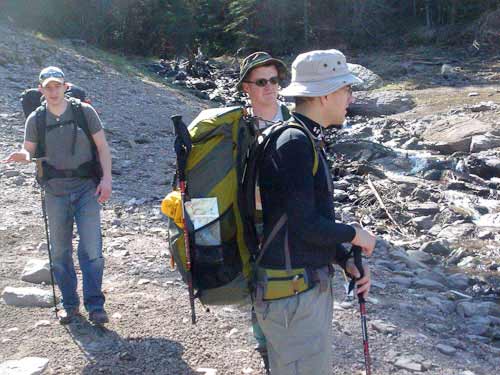Backpacking equipment overview
Note: this was written before the trip began
I’ve done a fair amount of backpacking over the years, and my packing aesthetic has undergone tremendous evolution.
I still remember the first weekend camping trip I went on as a young Boy Scout. I brought two enormous duffel bags full of clothes, toys, and gear. It was the spring of 1993, so the weather was mild, so there was no real need for bulky warm clothes. The toys? No time to use them. As for the gear, the Scout troop brought all of the tents, cooking gear, and food in a separate trailer. I must have had 50 lbs of unnecessary, bulky equipment with me, and the only thing I really needed was a sleeping bag.
These days, I’m a minimalist. Skin-out weight, including food, fuel, and water, comes in at less than 29 lbs. If I’m not going to use need something at least once on the trip, I don’t bring it. What I do bring is usually optimized for minimal trail size and weight rather than in-camp comfort. I think it’s a good trade-off.

Me (foreground) backpacking with friends in Flathead NF -- with a slightly mis-adjusted backpack.
Some thoughts on the major points:
- Shelter: Tarp instead of a tent. I have a lightweight solo backpacking tent, but I haven’t used it since 2008. The tarp works great at keeping me dry, and it’s far lighter than the tent. If it’s looking especially wet, or if I need a bit of extra warmth, I’ll use the bivy too. If it’s looking like a dry night, I won’t even unpack the tarp and will instead sleep under the stars. (For a ground cloth, I use the excellent and extremely light Gossamer Gear Polycryo Ground Cloth. Recommended.)
- Footwear: I use a boot that’s classified as “light hiking,” so it looks like a normal high-top hiking boot, is “waterproof” (Gore-Tex), and has an aggressive sole, but it doesn’t weigh too much. That said, trail running shoes would be even lighter, and though they wouldn’t be waterproof, they would be quick to dry. Once my current boots wear out, I’ll probably try switching to something of that genus.
- Water treatment: I like filters, and I dislike chemical treatments. Filters produce clear water, and the water they spurt out is usable immediately. Chemical treatments, on the other hand, remove none of the floaties found in surface water, leave an unpleasant taste, and require time to work. On top of that, chemical treatments are ineffective against some nasties, such as echinococcus. The drawback to filters is their size, weight, and pumping effort, all of which can be significant.
- Backpack: The lighter the better, though not at the expense of capacity. It’s nice to be able to carry bulky items, like my closed-cell-foam sleeping pad, inside the pack rather than outside of it. That helps to prevent snags on trees and branches as I go along.


Recent Comments